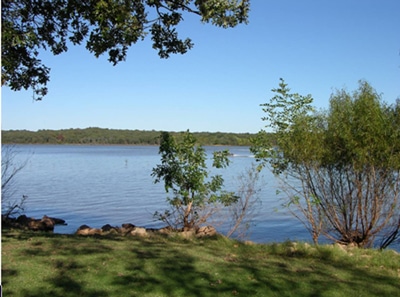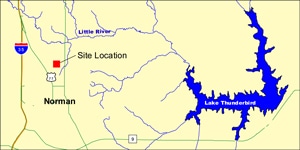Lake Thunderbird Watershed Implementation Project

The Conservation Commission Water Quality Division’s commitment to address non-point source run-off is providing an opportunity to demonstrate some innovative techniques in the Lake Thunderbird Watershed in central Oklahoma. While all of the agency’s U. S. Environmental Protection Agency-funded projects utilize monitoring, education and implementation of best management practices, most of those projects are concentrated in rural watersheds. However, with the 2008 grant the WQ division is employing Low Impact Development (LID) methods in this mostly urban watershed through a partnership with the University of Oklahoma.
Lake Thunderbird is a sensitive water supply lake, serving Norman, Midwest City and Del City. Excessive algae growth in the lake leads to water quality degradation that includes periodically undesirable taste and odor in the drinking water, and potentially ecological and recreational impairment. Growth of algae is accelerated via nutrients and sediment transported to the lake by runoff from diffuse or nonpoint sources in the watershed and has caused the lake to exceed the water quality limit for chlorophyll-a. As urban development continues and impervious surfaces increase, nutrient loading is projected to escalate, causing further deterioration of the lake’s water quality. Modeling done by Vieux and Associates, Inc., shows that each year an average of 20 tons of phosphorus is transported to the lake from nonpoint sources in the watershed.

The OCC Water Quality Division has contracted with the University of Oklahoma to provide a demonstration project in Norman’s Trailwoods residential neighborhood. Landscape architecture professor Reid Coffman as project coordinator has assembled a team that will design, construct and monitor the neighborhood with LID best management practices aimed at reducing stormwater discharge volumes and improving runoff quality. This project will function as a community education for agency and public officials.
Part of this process will assess current impediments to effective stormwater management that exist in land development ordinances that effectively prohibit principles and practices of LID. The team will compile existing codes from nearby states that support LID. A model LID code will be written for the city of Norman to provide guidance on planning, design and construction of new land developments.
Environmental assessment of the neighborhood is already underway with construction to occur over the next two and a half years. As construction nears completion, monitoring will commence in this development and in a paired development in which LID principles were not used so as to fully evaluate the viability of the best management practices including a determination of changes in stormwater quantity.
